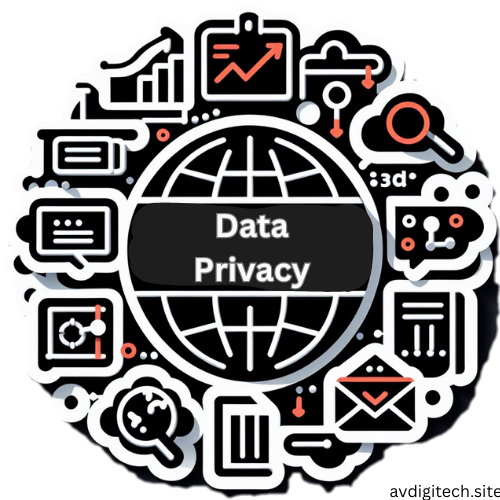If you want to know about “Data Privacy and Compliances”, So, your search ends here. Here you find all aspects about this topic.
If you want to know about Digital Marketing, So must visit our website “avdigitech.site“

Table of Contents
Introduction about Data privacy
In today’s digital age, where data is a prized asset, ensuring privacy and compliance has become paramount for businesses engaged in digital marketing. With the ever-evolving regulatory landscape and growing concerns about data breaches, understanding data privacy laws and compliance requirements is essential. In this blog post, we’ll delve into the intricacies of data privacy and compliance in digital marketing, exploring key concepts, regulations, and best practices.
Define Data Privacy
Data privacy refers to the protection of individuals’ personal information from unauthorized access, use, or disclosure. It involves ensuring that individuals have control over how their data is collected, processed, and shared by organizations. Data privacy encompasses practices and measures aimed at safeguarding sensitive information, such as names, addresses, financial details, and online activities, from being exploited for malicious purposes or without the explicit consent of the individual.
Key Components of Data Privacy and compliances
Consent: Individuals should provide explicit consent before their personal data is collected, processed, or shared. Consent should be freely given, specific, informed, and unambiguous.
Purpose Limitation: Personal data should be collected for specified, explicit, and legitimate purposes and not further processed in a manner that is incompatible with those purposes.
Data Minimization: Organizations should only collect and retain personal data that is necessary for the purposes for which it is being processed. Data should be limited to what is relevant, adequate, and not excessive.
Accuracy: Personal data should be accurate, kept up to date, and corrected if inaccurate or incomplete. Organizations should take reasonable steps to ensure the accuracy of the data they collect and maintain.
Security: Organizations must implement appropriate technical and organizational measures to protect personal data against unauthorized access, disclosure, alteration, or destruction. This includes measures such as encryption, access controls, and regular security assessments.
Transparency: Individuals should be provided with clear and easily understandable information about how their personal data is being processed, including the purposes of processing, the categories of data being processed, and their rights regarding their data.
Accountability: Organizations are responsible for complying with data protection laws and regulations and must be able to demonstrate their compliance through policies, procedures, and documentation. This includes appointing a data protection officer (DPO) where required and conducting privacy impact assessments (PIAs) to identify and mitigate privacy risks.
Importance of data privacy
Personal Security: Protecting sensitive personal information such as financial details, medical records, and contact information helps prevent identity theft, fraud, and other malicious activities.
Trust and Reputation: When organizations handle data responsibly, they build trust with their customers and stakeholders. Breaches of data privacy can lead to severe damage to reputation and loss of trust.
Legal Compliance: Many jurisdictions have strict regulations governing the collection, storage, and usage of personal data, such as the GDPR in Europe and the CCPA in California. Failure to comply with these regulations can result in significant fines and legal consequences.
Ethical Considerations: Respecting individuals’ privacy rights aligns with ethical principles of autonomy, fairness, and respect for human dignity.
Business Competitiveness: Prioritizing data privacy can be a competitive advantage. Customers are increasingly choosing to do business with companies that demonstrate a commitment to protecting their privacy.
Data Security: Strong data privacy measures often overlap with robust data security practices, ensuring that data is protected from unauthorized access, breaches, and cyber attacks.
If you want to know about Affiliate Marketing. So, chck our blogs “click here“
Conclusion of Data Privacy and Compliances
In conclusion, data privacy and compliance are paramount in today’s digital landscape. Organizations must prioritize the protection of personal information to maintain trust with their customers and adhere to legal and regulatory requirements. By implementing robust data privacy policies, employing encryption techniques, and regularly auditing their practices, businesses can mitigate the risks associated with data breaches , ensure compliance with relevant laws such as GDPR, CCPA, and others. Additionally, fostering a culture of privacy awareness among employees and providing ongoing training can further strengthen an organization’s commitment to safeguarding sensitive data. Ultimately, prioritizing data privacy and compliance not only protects individuals’ rights but also preserves the integrity and reputation of the business in an increasingly data-driven world.
Check our other sites “click here“
Our other business

Our contact number is 8076303420.
